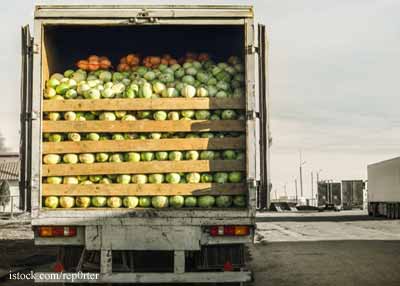The FDA has released the final Food Safety Modernization Act (FSMA) rule on Sanitary Transportation of Human and Animal Food. The earliest compliance dates for some firms begin one year after publication of the rule in the Federal Register. Problems in transportation, including mishandling and dirty containers, have been the cause of some food poisoning outbreaks over the years.
 The goal of this rule is to “prevent practices during transportation that create food safety risks, such as failure to properly refrigerate food, inadequate cleaning of vehicles between loads, and failure to properly protect food.” The rule builds on safeguards envisioned in the 2005 Sanitary Food Transportation Act. Unsanitary transportation practices have been discovered over the years, and regulations are needed to help prevent more foodborne illness outbreaks.
The goal of this rule is to “prevent practices during transportation that create food safety risks, such as failure to properly refrigerate food, inadequate cleaning of vehicles between loads, and failure to properly protect food.” The rule builds on safeguards envisioned in the 2005 Sanitary Food Transportation Act. Unsanitary transportation practices have been discovered over the years, and regulations are needed to help prevent more foodborne illness outbreaks.
The rule establishes requirements for shippers, loaders, carriers by motor or rail vehicle, and receivers. The requirements don’t apply to transportation by ship or air because of “limitations in the law,” according to the FDA. These rules apply whether or not the food enters interstate commerce.
It also applies to shippers in other countries who ship food to the U.S. directly by motor or rail vehicle from Canada or Mexico, or by ship or air, and arrange for transfer of the intact container onto a motor or rail vehicle for transportation within the United States.
The rule does not apply to exporters who ship food through the United States, for example, from Canada to Mexico, by motor or rail vehicle if the food doesn’t enter the U.S. distribution chain. Any company involved in the transportation of food that will be exported are covered by the rule until the shipment reaches a port or the U.S. border.
Vehicles and transportation equipment must be designed and maintained to ensure it doesn’t make the food unsafe. They must be able to be adequately cleaned, and capable of maintaining safe temperatures. Adequate temperature controls, preventing contamination of ready-to-eat food by raw food, protection of food from contamination by non-food items in the same or a previous load, and protection from food allergens are all covered under the rule.
Carrier personnel must be trained in sanitary transportation practices and documentation. When the carrier is responsible for sanitary conditions during transport, this training is required. Maintenance records of written procedures, agreements, and required training must be kept.
Some waivers can be obtained for this rule, including any shippers, carriers, and receivers that are inspected under the National Conference on Interstate Milk Shipments when Grade A milk and milk products are being transported. And food establishments holding permits issued by a state or tribal agency, including restaurants, supermarkets, and home delivery operations can request a waiver, since controls for those programs already exist under the Retail Food Program.




